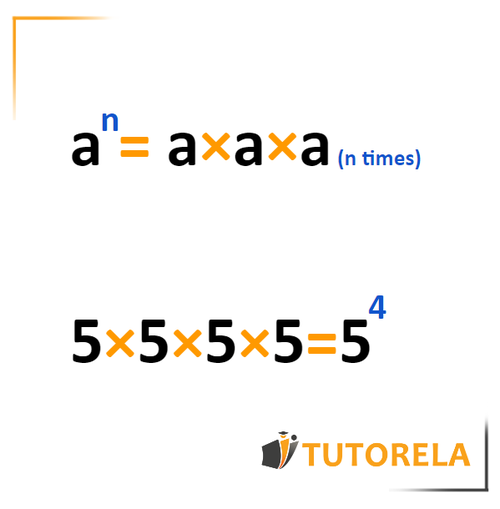The rules of exponentiation are rules that help us perform operations like addition, subtraction, multiplication, and division with powers. In certain exercises, if the rules of exponentiation are not used correctly, it will be very difficult to find the solution, so it's important to know them.
Don't worry! These aren't complicated rules. If you make an effort to understand them and practice enough, you'll be able to apply them easily.
Understanding Exponents
Join Over 30,000 Students Excelling in Math!
Endless Practice, Expert Guidance - Elevate Your Math Skills Today
Multiplication of Powers with the Same Base
an⋅am=an+m
If we multiply powers with the same base, the exponent of the result will be equal to the sum of the exponents.
For example
52⋅53=52+3=55
7X+1⋅72X+2=73X+3
X4⋅X5=X4+5=X9
Do you know what the answer is?
Division of Powers with the Same Base
aman=an−m
a=0
When we divide powers with the same base, the exponent of the result will be equal to the difference of the exponents.
For example
5354=54−3=51
7X72X=72X−X=7X
X5X7=X7−5=X2
Powers of Powers
Let's look at the following example of power of a power
(an)m=an⋅m
When we come across a power of a power, the result will be the multiplication of those powers.
For example
(a2)3=a2⋅3=a6
(aX)2=a2X
Do you think you will be able to solve it?
Power of the Multiplication of Several Terms
(a⋅b⋅c)n=an⋅bn⋅cn
For example
(2⋅3⋅4)2=22⋅32⋅42
(X⋅2⋅X)2=X2⋅22⋅X2
(X2⋅2⋅y3)2=X4⋅22⋅y6
Fractional Exponents
(ba)n=bnan
For example
(35)2=3252
(yX)3=y3X3
Do you know what the answer is?
Negative Exponents
Let's look at the following example of a negative exponent
a−n=an1
a−n1=an
This rule is often used to get rid of negative exponents.
For example
5−2=521=251
2−31=23=8
Rules for Raising 0 to a Power
a0=1
Any number raised to the power of 0 equals 1.
0n=0
The number 0 raised to any power (other than 0) equals 0.
00 = undefined
The value of the number 0 raised to the power of 0 is undefined.
Rules About Raising 1 to Any Power
1n=1
The number 1 raised to any power is equal to 1.
Do you think you will be able to solve it?
Power Exercises
Exercise 1: (Variables in the value of the power)
Task:
Solve the following equation:
(Am)n
(4X)2
Solution:
(4X)2=4X×2
Exercise 2: (Number of Elements)
(am)n=am×n
Task:
Solve the exercise:
(X2×3)2=?
Solution:
(X2×3)2=X2×2×32=X4×9=9X4
Before the formula:
(a×b)m=am×bm
And also
(am)n= Power of a power
Answer:
9X4
Exercise 3
Task:
Solve the exercise:
((7⋅3)2)6+(3−1)3⋅(23)4=?
Solution:
(7⋅3)2⋅6+3−1⋅3⋅23⋅4=?
2112+3−3⋅212=?
Answer:
2112+3−3⋅212
For problems like the following, you can use the formula:
(am)n=am⋅n
Exercise 4: (Properties of Powers)
Task:
Solve the following equation:
23⋅24+(43)2+2325=
Solution:
23⋅24+(43)2+2325=
23+4+43⋅2+2(5−3)=27+46+22
Answer:
27+46+22
The answer is supported by a series of properties:
- (am)n=am⋅n
- aYaX=aX−Y
- aX⋅aY=aX+Y
Do you know what the answer is?
Exercise 5
Task:
Which expression has the greatest value?
102,24,37,55
Solution:
102=100
24=16
37=2187
55=3125
Answer:
The greatest value is 55
Exercise 6
Task:
Solve the following equation:
((4X)3Y)2
Solution:
(4X)3Y⋅2=4X6Y
Exercise 7
Formula:
(am)n=am⋅n
Assignment:
Solve the following equation:
(42)3+(93)4=?
Solution:
(42)3+(93)4=?
42⋅3+93⋅4=46+912
Answer:
46+912
Questions and Answers on the Topic of Exponentiation
What are the laws of exponents?
Multiplication with the same bases, division with the same bases, and power of powers.
How is multiplication with the same bases done?
The exponents are added.
How is division with the same bases done?
The exponents are subtracted.
What is a number raised to the 0 equal to?
One, as long as the base is not zero.
Do you think you will be able to solve it?
Examples with solutions for Exponents Rules
Exercise #1
1120=?
Video Solution
Step-by-Step Solution
We use the zero exponent rule.
X0=1We obtain
1120=1Therefore, the correct answer is option C.
Answer
Exercise #2
Solve the following problem:
13=
Video Solution
Step-by-Step Solution
To solve this problem, we'll follow these steps:
Step 1: Identify the given information
Step 2: Apply the appropriate exponent rule
Step 3: Perform the calculation
Now, let's work through each step:
Step 1: The problem gives us the expression 13. This means we have a base of 1 and an exponent of 3.
Step 2: We'll use the exponentiation rule, which states that an=a×a×…×a (n times).
Step 3: Since our base is 1, raising 1 to any power will still result in 1. Therefore, we can express this as 1×1×1=1.
Therefore, the solution to 13 is 1.
Answer
Exercise #3
Solve the following problem:
70=
Video Solution
Step-by-Step Solution
To solve the problem of finding 70, we will follow these steps:
Step 1: Identify the general rule for exponents with zero.
Step 2: Apply the rule to the given problem.
Step 3: Consider the provided answer choices and select the correct one.
Now, let's work through each step:
Step 1: A fundamental rule in exponents is that any non-zero number raised to the power of zero is equal to one. This can be expressed as: a0=1 where a is not zero.
Step 2: Apply this rule to the problem: Since we have 70, and 7 is certainly a non-zero number, the expression evaluates to 1. Therefore, 70=1.
Therefore, the solution to the problem is 70=1, which corresponds to choice 2.
Answer
Exercise #4
Step-by-Step Solution
To solve (43)2, we use the power of a power rule which states that (am)n=am⋅n.
Here, a=4, m=3, and n=2.
So, we calculate 43⋅2,
which simplifies to 46.
Answer
Exercise #5
Step-by-Step Solution
To solve the given expression (23)6, we apply the power of a power rule (am)n=am⋅n. Here, a=2, m=3, and n=6.
Thus, we calculate the exponent:
3⋅6=18
So, (23)6=218.
Answer










